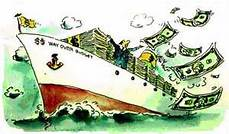 There was an interesting and still developing story in the news recently about money paid by the government for a piece of software that, to date, doesn’t work.
There was an interesting and still developing story in the news recently about money paid by the government for a piece of software that, to date, doesn’t work.
The reason it caught my attention was not really the dollar amount assigned to the waste but the fact that it was a software development project. That’s something my company does and I’ve been taking an increasing part in that process myself. I helped formulate my first bid recently and am beginning to get a more personal understanding of the concepts involved.
In this case the Air Force contracted for a complex piece of software that would do the job of many other pieces of software in a sort of unified system. There aren’t many details in the story and the contractor in question claims the software largely works. The Air Force spokesman says it does not.
What I want to talk about today is not necessarily the failure of this software but the entire idea of making the bidding process work.
My company is currently working on a piece of software that we seriously underbid. It’s an undertaking that has been going on for years. The thing that’s important to understand is that everyone loses. The company doesn’t have its software and we continue to throw man-hours at the problem without any extra pay. The problem largely arises from poor bidding practices. If the contract had been bid appropriately maybe the company would have said, no way, too expensive. They would have saved money and so would my company for we have spent for more in man-hours than we received in payment.
I see the bidding process with government agencies to be a mixed bag. Some agencies seem to be able to accept appropriate bids while others, particularly the defense department, seem willing to accept artificially low bids only to see projects fail to complete on time and arrive hugely over-budget.
This doesn’t work for anyone. The company that makes the low-bid ends up with the contract certainly but the amount of work they do is not commiserate with the pay and can turn into a losing situation for everyone, see the F35 debacle. The government does not get the equipment or at least only receives some substandard version of the equipment.
In this case what bothers me most is that the company that made the bad bid originally is still being contracted for a number of other government software programs. At the very end of the video they mention another $8 billion in software bids that apparently returned little or nothing.
As with my own company, this kind of thing can happen. People can underestimate bids, things can prove more complex than originally imagined. However, a company that fails this miserably should not get any more money. I don’t think that is the case with some government contracts. They are largely so rife with corruption that a fair and reasonable bid has no chance of getting the contract. I do think this is department dependent. Some departments manage their bids better than others.
The question becomes, how do we manage the bidding process to get the best product at a fair price? With billions and even trillions of dollars at stake the idea that we can remove corruption entirely from the process is naive. With that much money at stake unsavory sorts are going to be drawn in.
Capitalism means that the company making the bid should make money. The contract should then be fulfilled within a reasonable percentage of the original bid and a quality product delivered.
Sadly, I’m of the opinion that the money is so immense and the corruption so entrenched that there are no easy answers. An independent agency with the sole job of evaluating bids seems like a good idea but that adds complexity and cost because you have to pay those people. Possibly some sort of metric based system in which the quality of the final product and the proximity to the original bid are assigned numeric values. These values are accumulated over time to favor bidders with good track records. I’m generally in favor of such metric based systems although corruption in assigning values is still possible.
It’s a huge problem, not so much from the wasted billions, but the idea that if a company regularly fails to properly fulfill bids, said business should not continue to prosper. The very heart of capitalism, of Randian Objectivism, is rewarding success.
I’ve spoken about this many times. If we reward failure the system rots from the inside. This is not capitalism, however, it certainly is what we seem to have today.
Sword and Sorcery fantasy with a Libertarian Twist
Current Release: The Sword of Water
Next Release: The Spear of the Hunt
Pingback: Billions Spent on Paperless Vet Software – No Results | tomliberman